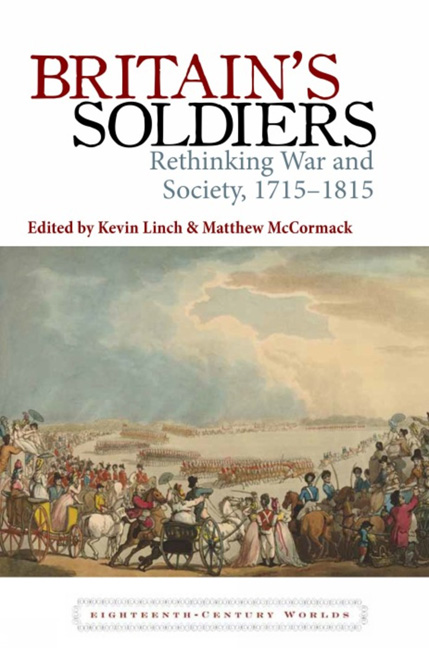Book contents
- Frontmatter
- Contents
- List of tables and figures
- Acknowledgements
- Notes on the contributors
- Introduction
- Part 1 Nationhood
- Part 2 Hierarchy
- Part 3 Discipline
- Part 4 Gender
- Part 5 Soldiers in Society
- 9 Disability, Fraud and Medical Experience at the Royal Hospital of Chelsea in the Long Eighteenth Century
- 10 Making New Soldiers: Legitimacy, Identity and Attitudes, c. 1740–1815
- Index
10 - Making New Soldiers: Legitimacy, Identity and Attitudes, c. 1740–1815
from Part 5 - Soldiers in Society
- Frontmatter
- Contents
- List of tables and figures
- Acknowledgements
- Notes on the contributors
- Introduction
- Part 1 Nationhood
- Part 2 Hierarchy
- Part 3 Discipline
- Part 4 Gender
- Part 5 Soldiers in Society
- 9 Disability, Fraud and Medical Experience at the Royal Hospital of Chelsea in the Long Eighteenth Century
- 10 Making New Soldiers: Legitimacy, Identity and Attitudes, c. 1740–1815
- Index
Summary
BETWEEN 1740 AND 1815, hundreds of thousands of men in Britain took part in some form of auxiliary military service for home defence, in the militia, limited service regiments and part-time formations. The history of these formations has received increasing scholarly attention in recent years, focused on the role as patriotic citizens (or not), their particularism and idiosyncrasies, the extent of mobilisation and the politics of their formation. There is, however, relatively little about them as soldiers, and in particular how these forms of soldiering came into being and were understood by contemporaries. Although there were huge varieties in the terms of service of these men, there were fundamental similarities between them. They were all fairly ‘regular’ in that they adopted the uniform, drill and weaponry of the regular army and, just as significantly, sought to legitimise their role and behaviour as soldiers through similar mechanisms. This chapter examines all the men in auxiliary forces in Britain, both full-time and part-time soldiers outside of the line regiments of the British Army. In most cases these were temporary military formations raised in wartime with limited terms of service (at most the British Isles), and this has resulted in them often being compartmentalised in existing works on the subject. What follows is an examination of all of them to explore the broader military culture that was created in this period, and also consider why it was so homogenous.
Concomitant with a broad approach to auxiliary soldiers in this chapter is an equally wide chronological framework, which also requires some explanation. The military crisis of the Forty-Five Rebellion prompted debates about arming the people to provide additional military forces in Britain to counter any invasion, with equally strong concerns about order and discipline if this was done. Moreover, it provoked deliberations about the nature of British society, particularly around its lack of martial, and often by extension masculine, spirit. These themes emerged again and again through the conflicts in the period, and the response to Earl Shelburne's plan for encouraging local forces in 1782 exemplifies the debates about mass arming and legitimacy. On the one hand, some viewed any such plan with alarm, whilst Charles James Fox saw this as an opportunity to strengthen Britain's military ‘and to do this by the consent, and with the concurrence of the people themselves’.
- Type
- Chapter
- Information
- Britain's SoldiersRethinking War and Society, 1715–1815, pp. 202 - 219Publisher: Liverpool University PressPrint publication year: 2014



